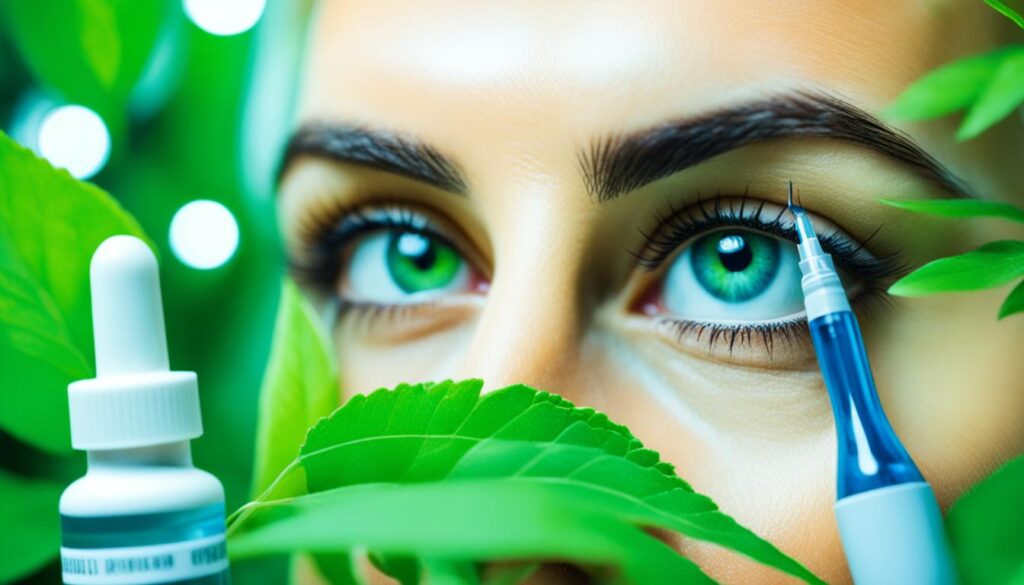Diabetic retinopathy, a condition characterized by damage to the retina due to diabetes, is a leading cause of blindness in the working-age population. While laser photocoagulation has been the traditional treatment approach, there is a growing interest in exploring natural remedies and lifestyle changes that may help reverse the progression of diabetic retinopathy. Studies have shown that certain vitamins and antioxidants, such as folic acid, alpha-lipoic acid, and vitamin D3, can potentially suppress inflammation and oxidative stress in the retina, offering a holistic approach to improving eye health.
Key Takeaways:
- Diabetic retinopathy is a leading cause of blindness in the working-age population.
- Laser photocoagulation has been the traditional treatment approach for diabetic retinopathy.
- There is growing interest in natural remedies and lifestyle changes to reverse diabetic retinopathy.
- Studies have shown that certain vitamins and antioxidants can help protect the retina from damage.
- A holistic approach involving dietary changes and lifestyle modifications may improve eye health.
The Prevalence and Burden of Diabetic Retinopathy
Diabetic retinopathy is a common complication of diabetes, affecting a significant number of individuals worldwide. According to a systematic review and meta-analysis of global data, the prevalence of diabetic retinopathy is high and projected to increase in the future. This condition not only takes a physical and emotional toll on individuals but also places a significant economic burden on healthcare systems.
Addressing the prevalence and burden of diabetic retinopathy is of utmost importance. Thankfully, there is growing interest in finding natural ways to manage and potentially reverse the progression of this condition, offering renewed hope for individuals seeking holistic approaches to their eye health.
Statistics on Diabetic Retinopathy
Let’s take a look at some statistics to better understand the prevalence and burden of diabetic retinopathy:
| Statistic | Value |
|---|---|
| Global Prevalence of Diabetic Retinopathy | High |
| Projected Increase in Prevalence | Yes |
| Economic Burden on Healthcare Systems | Significant |
Diabetic retinopathy affects a substantial number of individuals worldwide and is expected to continue rising. The economic burden on healthcare systems adds another layer of urgency to finding natural ways to manage and potentially reverse this condition.
By exploring and implementing natural remedies and lifestyle modifications, individuals can take charge of their diabetic retinopathy management, potentially reducing the burden on both themselves and healthcare systems.
Understanding the Pathogenesis of Diabetic Retinopathy
The pathogenesis of diabetic retinopathy is a complex process that involves multiple mechanisms and contributes to the development and progression of this condition. By understanding these underlying mechanisms, we can develop effective holistic approaches to managing and reversing diabetic retinopathy naturally.
Diabetic retinopathy is primarily caused by chronic hyperglycemia and fluctuating blood glucose levels, which result in cellular damage within the retina. This damage leads to capillary cell death, alteration of the retinal pericyte/endothelial cell ratio, and vascular occlusion.
“The alteration of the retinal pericyte/endothelial cell ratio and vascular occlusion all contribute to the pathogenesis of diabetic retinopathy.”
The resulting ischemia triggers the release of growth factors, which promote neovascularization (the formation of abnormal blood vessels) and increased vascular permeability. These processes further exacerbate retinal damage and vision impairment.
Inflammation and oxidative stress also play significant roles in the development and progression of diabetic retinopathy. Inflammatory mediators and reactive oxygen species contribute to retinal vascular dysfunction and the breakdown of the blood-retinal barrier.
“Inflammation and oxidative stress contribute to retinal vascular dysfunction and the breakdown of the blood-retinal barrier.”
An integrated holistic approach to managing diabetic retinopathy must address these underlying mechanisms. By focusing on reducing chronic hyperglycemia, stabilizing blood glucose levels, and mitigating inflammation and oxidative stress, we can support retinal health and potentially reverse the progression of diabetic retinopathy naturally.
Now, let’s take a closer look at the various medical treatment options available for diabetic retinopathy in Section 4.
Medical Treatment Options for Diabetic Retinopathy
When it comes to managing diabetic retinopathy, traditional medical treatments have long been the go-to option. Laser photocoagulation and pharmacotherapy are among the most commonly used interventions. Laser photocoagulation targets specific areas of the retina, helping to prevent severe visual loss by reducing the incidence of macular edema and proliferative retinopathy. On the other hand, pharmacotherapy, such as anti-vascular endothelial growth factor (anti-VEGF) injections, plays a significant role in managing diabetic retinopathy by inhibiting the growth of abnormal blood vessels.
While these medical treatments are effective, there is a growing interest in finding natural ways to improve diabetic retinopathy. Many individuals are exploring alternative options such as dietary modifications, nutritional supplementation, and lifestyle changes to complement traditional medical interventions. By adopting a holistic approach to diabetic retinopathy treatment, individuals can potentially enhance the effectiveness of medical treatments and improve their chances of preserving vision naturally.
| Medical Treatment Options | Benefits |
|---|---|
| Laser Photocoagulation | – Reduced risk of severe visual loss – Decreased incidence of macular edema and proliferative retinopathy |
| Pharmacotherapy | – Inhibits growth of abnormal blood vessels – Manages symptoms and slows disease progression |
In conjunction with medical treatments, incorporating natural remedies can offer additional benefits. Let’s explore these natural ways to improve diabetic retinopathy in more detail.

Role of Antioxidants and Vitamins in Diabetic Retinopathy
When it comes to finding natural remedies for diabetic retinopathy and reversing diabetic eye disease naturally, antioxidants and vitamins have shown great potential. Numerous studies have explored the effects of specific nutrients on diabetic retinopathy, highlighting their antioxidant and anti-inflammatory properties that can help protect against retinal damage and reduce oxidative stress and inflammation in the retina.
Among the key vitamins that have been studied are Vitamin C, Vitamin E, and Vitamin D. These vitamins have shown promising results in managing diabetic retinopathy and may contribute to its reversal. Beta carotene, zinc, and omega-3 fatty acids have also been investigated and found to have positive effects on retinal health. By incorporating these nutrients into one’s diet or through supplementation, individuals with diabetic retinopathy can potentially improve their eye health naturally.
Furthermore, certain antioxidants like lutein and zeaxanthin have been associated not only with a decreased risk of diabetic retinopathy but also with a lower likelihood of age-related macular degeneration. Age-related macular degeneration often coexists with diabetic retinopathy, making the benefits of these antioxidants even more significant.
It’s important to note that while antioxidants and vitamins show promise in managing and potentially reversing diabetic retinopathy naturally, individual results may vary. Therefore, it is crucial to consult with healthcare professionals and ophthalmologists to develop a personalized approach that aligns with your specific needs and circumstances.

Combining the power of antioxidants and vitamins with other natural approaches, such as lifestyle modifications and targeted medical treatments, can create a comprehensive and integrative strategy for managing diabetic retinopathy. By taking a proactive approach and utilizing the full range of resources available, individuals can potentially slow the progression of the disease and improve their chances of maintaining clear vision and overall well-being.
Lifestyle Modifications for Diabetic Retinopathy Management
In addition to dietary modifications and nutritional supplementation, making lifestyle changes can also help manage and potentially reverse diabetic retinopathy. Regular exercise and maintaining a healthy weight are important for overall diabetes management and may have a positive impact on retinal health. Managing blood glucose levels, blood pressure, and cholesterol levels through proper diet, exercise, and medication adherence can also play a significant role in preventing further retinal damage.
Quitting smoking is another important lifestyle modification for individuals with diabetic retinopathy, as smoking has been linked to an increased risk of vision loss and progression of retinal damage.
The importance of regular exercise
Regular exercise is beneficial for individuals with diabetic retinopathy in several ways. Firstly, it helps to improve insulin sensitivity, allowing better control of blood glucose levels. Secondly, it aids in maintaining a healthy weight, reducing the risk of obesity-related complications. Finally, exercise promotes better circulation, which is crucial for supplying oxygen and nutrients to the retina, thereby supporting the overall health of the eyes.
Managing blood glucose, blood pressure, and cholesterol levels
Achieving and maintaining optimal blood glucose, blood pressure, and cholesterol levels are essential for managing diabetic retinopathy. Consistently high blood glucose levels can lead to damage in blood vessels throughout the body, including the retina. Regular monitoring of blood glucose levels, following a balanced meal plan, and adhering to prescribed medication or insulin regimens can help keep blood glucose levels in check.
Maintaining healthy blood pressure is also crucial for individuals with diabetic retinopathy as high blood pressure can further damage blood vessels and increase the risk of vision loss. Lifestyle modifications such as reducing sodium intake, engaging in regular physical activity, and taking prescribed medications as directed by healthcare professionals can help manage blood pressure effectively.
Elevated cholesterol levels can contribute to the progression of diabetic retinopathy. Following a heart-healthy diet low in saturated fats, trans fats, and cholesterol, along with regular exercise, can help maintain healthy cholesterol levels and reduce the risk of retinal damage.
Quitting smoking
Smoking has detrimental effects on the blood vessels throughout the body, including those in the eyes. It can increase the risk of developing and worsening diabetic retinopathy, as well as other eye diseases. Quitting smoking is essential for individuals with diabetic retinopathy to prevent further vision loss and halt the progression of retinal damage.
| Lifestyle Modifications | Benefit |
|---|---|
| Regular exercise | – Improves insulin sensitivity – Supports weight management – Enhances overall circulation, including ocular blood flow |
| Managing blood glucose levels | – Prevents damage to retinal blood vessels – Reduces the risk of vision loss |
| Managing blood pressure levels | – Limits further retinal damage – Minimizes the risk of vision loss |
| Managing cholesterol levels | – Reduces the risk of retinal damage – Supports overall cardiovascular health |
| Quitting smoking | – Decreases the risk of diabetic retinopathy progression – Reduces the risk of vision loss |
Integrative Approach to Diabetic Retinopathy
A holistic or integrative approach to managing diabetic retinopathy combines traditional medical treatments with natural remedies and lifestyle modifications. This comprehensive approach addresses the underlying mechanisms of retinal damage, focusing not only on symptom management but also on promoting overall health and well-being.
By incorporating dietary changes, nutritional supplementation, regular exercise, stress reduction techniques, and other lifestyle modifications, individuals with diabetic retinopathy can potentially slow the progression of the disease and improve their retinal health naturally.
Nutrition for Diabetic Retinopathy
Proper nutrition plays a crucial role in managing diabetic retinopathy. A diet rich in antioxidants, vitamins, and minerals can help protect the retina from further damage and support its healing process. Including foods high in vitamin C, vitamin E, beta carotene, zinc, omega-3 fatty acids, and other nutrients can help reduce oxidative stress and inflammation in the retina.
“Proper nutrition plays a crucial role in managing diabetic retinopathy.”
Exercise and Physical Activity
Regular exercise and physical activity contribute to overall health and can have a positive impact on diabetic retinopathy. Engaging in aerobic exercise, strength training, and activities that promote flexibility and balance can help improve blood circulation, reduce inflammation, and manage blood sugar levels. It is essential to consult with a healthcare professional before starting any exercise program and to choose activities that are safe and suitable for individual needs.
Stress Reduction Techniques
Chronic stress can negatively affect health, including eye health. Stress can lead to elevated blood pressure, inflammation, and impaired immune function, all of which can exacerbate diabetic retinopathy. Practicing stress reduction techniques such as meditation, deep breathing exercises, yoga, or engaging in hobbies and activities that bring joy and relaxation can help manage stress levels and improve overall well-being.
Sleep and Eye Health
Adequate sleep is crucial for maintaining overall health and supporting optic nerve health. Poor sleep quality or insufficient sleep can affect blood sugar control and increase the risk of developing or worsening diabetic retinopathy. Establishing a regular sleep routine, practicing good sleep hygiene, and prioritizing quality sleep can contribute to better eye health and overall wellness.
By adopting an integrative approach that combines traditional medical treatments with natural remedies and lifestyle modifications, individuals with diabetic retinopathy can actively participate in their own healing process. This approach offers a holistic solution that not only targets the specific symptoms but also takes into account the individual’s overall well-being. It is important to consult with healthcare professionals and ophthalmologists for personalized recommendations and to ensure proper management of diabetic retinopathy.
Conclusion
Reversing diabetic retinopathy naturally requires a holistic approach that targets the underlying mechanisms of retinal damage. By incorporating natural remedies, such as antioxidants and vitamins, along with lifestyle modifications, individuals with diabetic retinopathy can potentially slow the progression of the disease and improve their chances of preserving their vision.
Addressing the root cause of retinal damage involves managing blood glucose levels and promoting overall health and well-being. Consulting with healthcare professionals and ophthalmologists is essential for personalized recommendations and ongoing monitoring of retinal health.
With a comprehensive and integrative approach, individuals can find renewed hope for clear vision and an improved quality of life. By taking control of their diabetes and embracing natural ways to improve diabetic retinopathy, patients can significantly impact the course of their eye health and achieve long-term positive outcomes.


